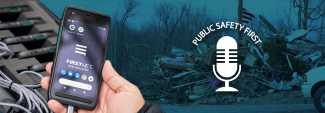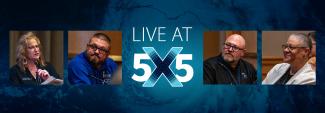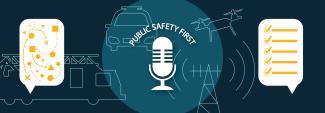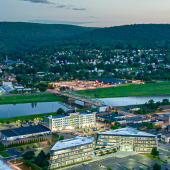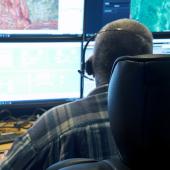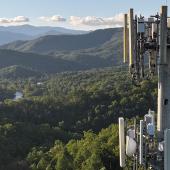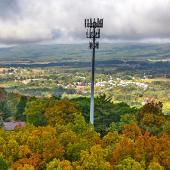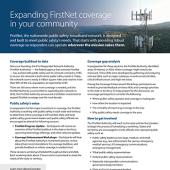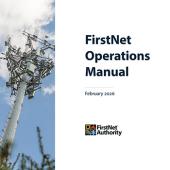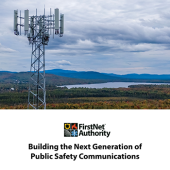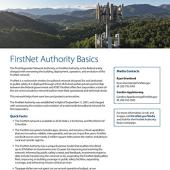Summary
In the latest installment of the FirstNet Authority Roadmap podcast series, Senior Public Safety Advisor, David Cook is joined by CEO and co-founder of Skyfire Consulting, Matt Sloane,
to discuss how drones are enhancing situational awareness for first responders.
Guest
David Cook
FirstNet Authority Senior Public Safety Advisor
Matt Sloane
CEO and Co-Founder, Skyfire Consulting
Transcript
Preview
Dave Buchanan: Hi, this is Dave Buchanan and welcome to the Public Safety First podcast. The podcast you’re about to hear is part of our Roadmap podcast series, which provides more information about the FirstNet Authority Roadmap – our guide to the future of FirstNet.
As part of this series, we’re showcasing the six domains that provide the foundation for the Roadmap. Today’s episode dives into the Situational Awareness domain, which focuses on how FirstNet can be used to collect data and turn it into actionable information for first responders. In today’s episode, FirstNet Authority Senior Public Safety Advisor David Cook speaks with Matt Sloane, CEO and Co-Founder of SkyFire Consulting. Their discussion highlights the ways drones are increasingly being used by public safety to enhance response and situational awareness. Thanks for listening!
Dave Buchanan: Hi, this is Dave Buchanan and welcome to the Public Safety First podcast. The podcast you’re about to hear is part of our Roadmap podcast series, which provides more information about the FirstNet Authority Roadmap – our guide to the future of FirstNet.
As part of this series, we’re showcasing the six domains that provide the foundation for the Roadmap. Today’s episode dives into the Situational Awareness domain, which focuses on how FirstNet can be used to collect data and turn it into actionable information for first responders. In today’s episode, FirstNet Authority Senior Public Safety Advisor David Cook speaks with Matt Sloane, CEO and Co-Founder of SkyFire Consulting. Their discussion highlights the ways drones are increasingly being used by public safety to enhance response and situational awareness. Thanks for listening!
David Cook: My name is David Cook. I am a Senior Public Safety Advisor for the First Responder Network Authority, and I’m speaking with the owner-operator of SkyFire Consultations.
Matt Sloane Yep.
David Cook: Matt, tell us a little bit about yourself.
Matt Sloane Yeah, absolutely. So I got my start actually in EMS early on in my career. Then I transitioned into, I was actually a medical news journalist for about 14 years, and then I started playing around with drones and realized like, “wow, this really has a lot of application for what I did in public safety,” and got really excited about that, and started working with public safety agencies around the country to help them start safe and legal drone programs. And we’ve now worked with close to 200 agencies coast-to-coast, and we’re really seeing this industry just change completely in front of our eyes. It’s very exciting.
David Cook: I understand that your company provided some services during the Super Bowl. What did you do?
Matt Sloane We did, yeah. So we had two tethered drone aircraft on top of two buildings here in Atlanta, and over the course of four days, we provided aerial surveillance for all of the different public safety agencies – local, state, and federal – and we were on tethers, so basically we were in the same spot for those four days. But what we were able to do is look at ingress and egress points, we were able to look at, you know, when there were fights going on, we could zoom in and see what was going on, when they had ambulances come in, we could kind of follow them through the crowds. And it was the first time drones had ever been used in a big tier 1 event in the U.S., and it was very successful. Everybody that was on the receiving end – it was about 12 different agencies were watching the feed, which we ran through FirstNet, and it was very successful.
David Cook: Why did you run them through FirstNet?
Matt Sloane Because we realized that we wouldn’t have had coverage any other way because, you know, I tried to use my regular, non-FirstNet cell phone and couldn’t even make a phone call, but when we started streaming video, we knew we were going to need a significant amount of bandwidth. So we went to our partners at the state emergency management agency and they gave us some FirstNet SIMs to use for that event, so for four days, we were using that connectivity to use the streaming software that we used for the event.
David Cook: Did you take into consideration security of that data?
Matt Sloane Yeah, absolutely. So, we actually had a dual layer of security because all of the security that’s built in through the FirstNet network, and then the software we use has, you know, layers of encryption that meet FBI standards and things like that, so it was important to me because there were several hundred thousand people here, and so making sure that the data only got to the people who needed it was obviously important to us, but also, more importantly, to our partners.
David Cook: So, at the Super Bowl you assisted with situational awareness.
Matt Sloane Mm-hmm.
David Cook: How else do you think a drone could provide an incident commander with some situational awareness input?
Matt Sloane Yeah, well, situational awareness is the name of the game all across the board no matter what type of incident you’re talking about, so whether that be on a fire scene and you need to know where the hotspots are, you might not be able to get a crew around the back of the house to see if there’s a giant propane tank back there, so, you put an aircraft in the air, look for the hazards that you’re about to walk in to. Same thing on the law enforcement end of things. You know, what are my guys about to go into? We can fly a drone through a building and find out who’s, you know, who’s inside. We can read placards on a, you know, an overturned truck or trailer before we put someone in a level-A suit. But the name of the game is safety, right, so we’re trying to make it safer for first responders, where they don’t have to put their lives in danger. Same reason that a bomb squad would use a robot – this is exactly that, as well. I’d rather have a machine go in and risk its life, so to speak, before I’d put a person in there to do it.
David Cook: I was told that there is a fire department that uses drones to search the desert and if they find their victim, they drop them a bottle of water and a telephone. Is that a realistic –
Matt Sloane Oh, yeah, absolutely. The only rule right now that we have to kind of stick within in that context is line of sight. So as long as I can see the drone from where I’m operating it, I can carry something with it, I can drop something with it. We frequently will drop life jackets from drones, radios, cell phones, water bottles. Another use case I’ve recently seen is that we had a SWAT team put a tourniquet on a drone in case somebody got a cut and they were pinned and they couldn’t get out, you could actually fly a medical kit to them. So really, the drone is just a vehicle for anything you want to put on it, whether it’s a camera or payload or anything like that.
David Cook: What kind of advancements in technology have you seen in the drone industry in the past few years, and where do you think it’s going in the near future?
Matt Sloane It’s unbelievable. Now we’ve got high-end thermal cameras, we’ve got zoom cameras, we’ve got optical gas imagers, things like that. I think that, you know, we’re going to see new imaging payloads come out, and I think that will be happening very soon. The other big advancements I think are going to be on the software end. You know, the drones, the batteries are sort of at the limit of where they’re going to be, the cameras are really good. I’m sure it’ll get better, but they’re already really good. What’s really interesting to me is – what do you do with all of this data when you get it? And, you know, can I run it through an artificial intelligence engine, and will that help me understand what the scenario is? Will that help me predict where the wildfire is going to go next? So, things like that, I think, are really going to be where the huge advancements come in the next couple of years.
David Cook: Would you say that drone technology is something that a modern incident commander should be considering when they’re designing new trucks?
Matt Sloane Absolutely, without a doubt. I mean, this is – I’ve been accused of using this phrase in a hyperbolic manner, but I really think this is the best tool we’ve gotten since the fire hose. And I really mean it. It sounds crazy, but when you think about the way that we’ve been fighting fires for all these years – you pull up on a scene and you just look at what’s in front of you. You have no other information other than what you can see with your eyes. So now, you know, you start to put a drone up in the air, you can start to get a 360 view immediately. Then you put a thermal camera on there. Now you got even more data. You put an optical gas imager, or a HAZMAT detector. The amount of information you can get from one small platform is through the roof. It’s unbelievable, and so, yeah, I think if you’re not considering it, you should be, and you probably will be in the next year or two.
David Cook: And what role will FirstNet play in drone technology?
Matt Sloane So, I think the importance of FirstNet is the fact that, you know, I talked about data as sort of the new currency in the drone world. We’re going to be moving a lot of data. It’s not just going to be video, right? We’re going to be running things through artificial intelligence, processing engines, and streaming video, and we’re going to be remotely piloting the aircraft over data networks, and, so, the idea of having a dedicated bandwidth, dedicated network where we can use these data sources back and forth without having to worry about, you know, also sharing the same bandwidth with the public, I think is critical. The security of that data is critical, and having a common system that all public safety can, you know, interoperate on, so I think, FirstNet is going to be a major factor in how this industry grows for sure.
David Cook: This is David Cook speaking live from the International Association of Fire Chiefs in Atlanta, Georgia. Thank you.
Matt Sloane Oh absolutely, pleasure to do this.
Narrator: Thanks for listening today. We're excited to have you join our podcast community. Make sure to subscribe on iTunes, SoundCloud, and YouTube. You can learn more about the First Responder Network Authority at FirstNet.gov and learn about FirstNet products and services at FirstNet.com.



